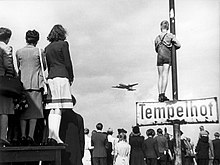The Cold War/The Berlin Airlift
The Western powers and the USSR emerged victorious out of World War Two and agreed to divide Germany and the capital, Berlin (which was in the Soviet zone) between them into four zones. However, they disagreed over how the country should be run.

The Western powers (Britain, France and the USA) wanted to help rebuild the German economy and infrastructure and get it back on its feet as soon as possible, whereas Stalin hand, wanted compensation and reparations to be paid for the damage done to the Soviet Union during the war. He also wanted to ensure that Germany would never again be able to invade the USSR.
The Soviets transported factory machinery and other goods back to the Soviet Union, from East Germany, and when Harry Truman, the US president, refused to let the Western zones of Germany pay reparations to the USSR, Stalin reacted by putting a communist government in the Soviet zone.
A New Currency
editIn June 1948, a new currency, the Deutschmark, was introduced in the Western zones and in West Berlin to help tackle inflation and bring back prosperity to the nation. However, the Soviets viewed this as a threat and were frightened that this would bring the whole of Berlin, and therefore the whole of the Soviet zone under Western, capitalist influence.
Berlin Blockade
editThe USSR responded by closing all rail, road and canal links carrying vital supplies from the Western half of Germany into West Berlin in an attempt to starve the people of West Berlin and force the Western powers out of Berlin. However, the Western powers responded by airlifting the much-needed supplies into Tegel and Tempelhof Airports, in West Berlin. This came to be known as the "Berlin Airlift", and lasted for almost a year, from 28th June 1948 until 11th May 1949.
A total of 278, 228 flights were made in and out of Berlin, by USAF, RAF and civilian planes delivering over two million tons of supplies, including food, clothing, medicine, coal and building supplies. Stalin eventually realised that the West was determined to hold on to the city and, on the 11th May 1949, he lifted the blockade, and supplies were once again allowed in overland.
The Consequences
editThe West realized that it was impossible to work with the USSR to run post-war Germany and, on 23 May 1949, they decided to merge their zones into a new and separate, democratic state called the Federal Republic of Germany (West Germany). The Soviet Union responded four months later by turning their zone into a communist state called the German Democratic Republic (East Germany).
Germany and the city of Berlin remained a divided country for the next 41 years until the end of the Cold War, when, in 1990, it was re-unified.
The Cold War
Introduction - Background - Strategy - Truman Doctrine - Marshall Plan - Berlin Blockade - Korean War - Hungarian Uprising - Cuban Missile Crisis - USSR under Gorbachev - USA under Reagan - Arms Race - Space Race
Cover - Contents - Study Guide
Please read the page creation guidelines before creating a new page.